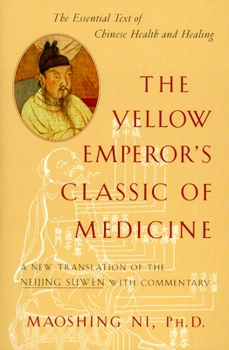The Yellow Emperor's Classic of Medicine: A New Translation of the Neijing Suwen with Commentary
The Neijing is one of the most important classics of Taoism, as well as the highest authority on traditional Chinese medicine. Its authorship is attributed to the great Huang Di, the Yellow Emperor, who reigned during the third millennium BCE. This new translation consists of the eighty-one chapters of the section of the Neijing known as the Suwen, or "Questions of Organic and Fundamental Nature." (The other section, called the Lingshu, is a technical book on acupuncture and is not included here.) Written in the form of a discourse between Huang Di and his ministers, The Yellow Emperor's Classic of Medicine contains a wealth of knowledge, including etiology, physiology, diagnosis, therapy, and prevention of disease, as well as in-depth investigation of such diverse subjects as ethics, psychology, and cosmology. All of these subjects are discussed in a holistic context that says life is not fragmented, as in the model provided by modern science, but rather that all the pieces make up an interconnected whole. By revealing the natural laws of this holistic universe, the book offers much practical advice on how to promote a long, happy, and healthy life. The original text of the Neijing presents broad concepts and is often brief with details. The translator's elucidations and interpretations, incorporated into the translation, help not only to clarify the meaning of the text but also to make it a highly readable narrative for students--as well as for everyone curious about the underlying principles of Chinese medicine.
Format:Paperback
Language:English
ISBN:1570620806
ISBN13:9781570620805
Release Date:May 1995
Publisher:Shambhala
Length:336 Pages
Weight:1.06 lbs.
Dimensions:0.9" x 6.0" x 9.0"
Customer Reviews
6 ratings
Happy to have this book Great price and condition !
Published by TC , 1 year ago
A “must have” for TCM practitioners :)
Great explanations
Published by Thriftbooks.com User , 16 years ago
Its a great book to explain in English the translations of yellow emperor...easy to follow
Classically oriented, yet contemporarily relevant
Published by Thriftbooks.com User , 18 years ago
First off I would like to address a point made earlier by another reviewer who called into question Mr. Ni's background in classical Chinese Medicine by stating that he is not trained in Taiwan. I am not sure where the impression is given that Taiwan is the only place where classical Chinese medicine can be learned, but it is erroneous. Mr. Ni is the product of generations of family physicians and who's father is incidently a classical taoist teacher/master of esteemed lineage, so one may rightly assume his training was very classical. Further, Mr. Ni begins his introduction by stating that he never intended a word for word translation but rather a clinically useful text that conveys the thought and intent of the original text in terms that would be more readily accesible to those who are not scholars of ancient Chinese literature. This he does exceptionally well. I have read every translation (and incidently attempted a few of my own) of this classical text and I feel this is by far the best. While not a translation it is the most clinically useful of all of the texts translated to date.
The Yellow Emperor's Classic of Medicine
Published by Thriftbooks.com User , 18 years ago
Well translated and easy to understand the concepts for anyone not familiar with chinese medicine and thought.
The best we have.
Published by Thriftbooks.com User , 18 years ago
As an graduate student who has worked on translating the Huangdi Neijing Suwen, I have had the opportunity to place this translation side-by side with most of the others currently in print. This is one of the best we have. The Neijing is often arcane and difficult to penetrate because of opaque language, and it is invariably read with a later commentary alongside to assist in understanding. Ni has provided the commentary and translation integrated on the same page. No, this is not a word-for-word translation, but it does capture the gist of the text and explain how it is understood in contemporary clinical settings more effectively than any other English translation currently available. Until there is a critical academic edition of the text, this is probably as good as it gets. Clinicians will probably prefer this over an academic translation anyway as it smoothes out many of the original's rough edges and internal contradictions, and applies the passages to Chinese medical theory as it is understood today.
a solid paraphrase for the practitioner
Published by Thriftbooks.com User , 25 years ago
While this book is sometimes criticised for its lack of scholarly style, it is important to realize that the writer is approaching a 2,500 year old work, the seminal theoretical treatise of Chinese medicine, from the point of view of a clinician. It is frankly not much easier for native speakers of Chinese to approach the Neijing in its original form than it is for Westerners. Moreover, Mr Ni comes from a medical family spanning several generations of physicians. Being a practitioner myself, I can attest to the correctness of the decisions made in preparing this book. He has done a commendable job in making this ancient classic accessible to modern readers. Chinese physicians make use of this material during nearly every moment spent in the clinic. It is practical in a way that sinologists locked in their ivory towers can scarcely imagine.Those who would prefer a dry, smugly academic translation with separate footnotes, devoid of historical context or cultural annotation, would do well to investigate Ilza Veith's translation of the Neijing; a valiant effort which inevitably fails as a result of its refusal to acknowledge the living traditions surrounding the text itself.






